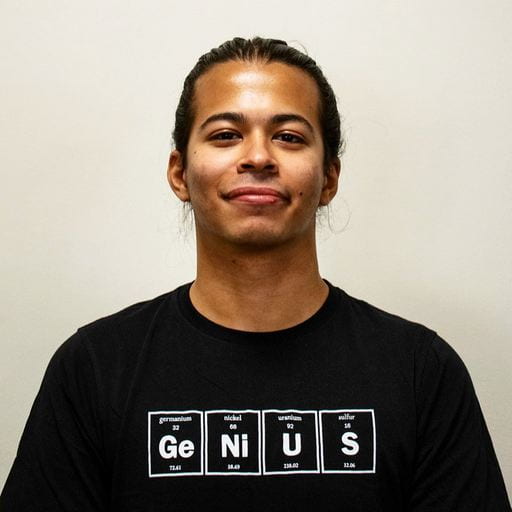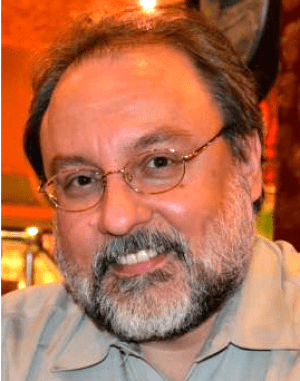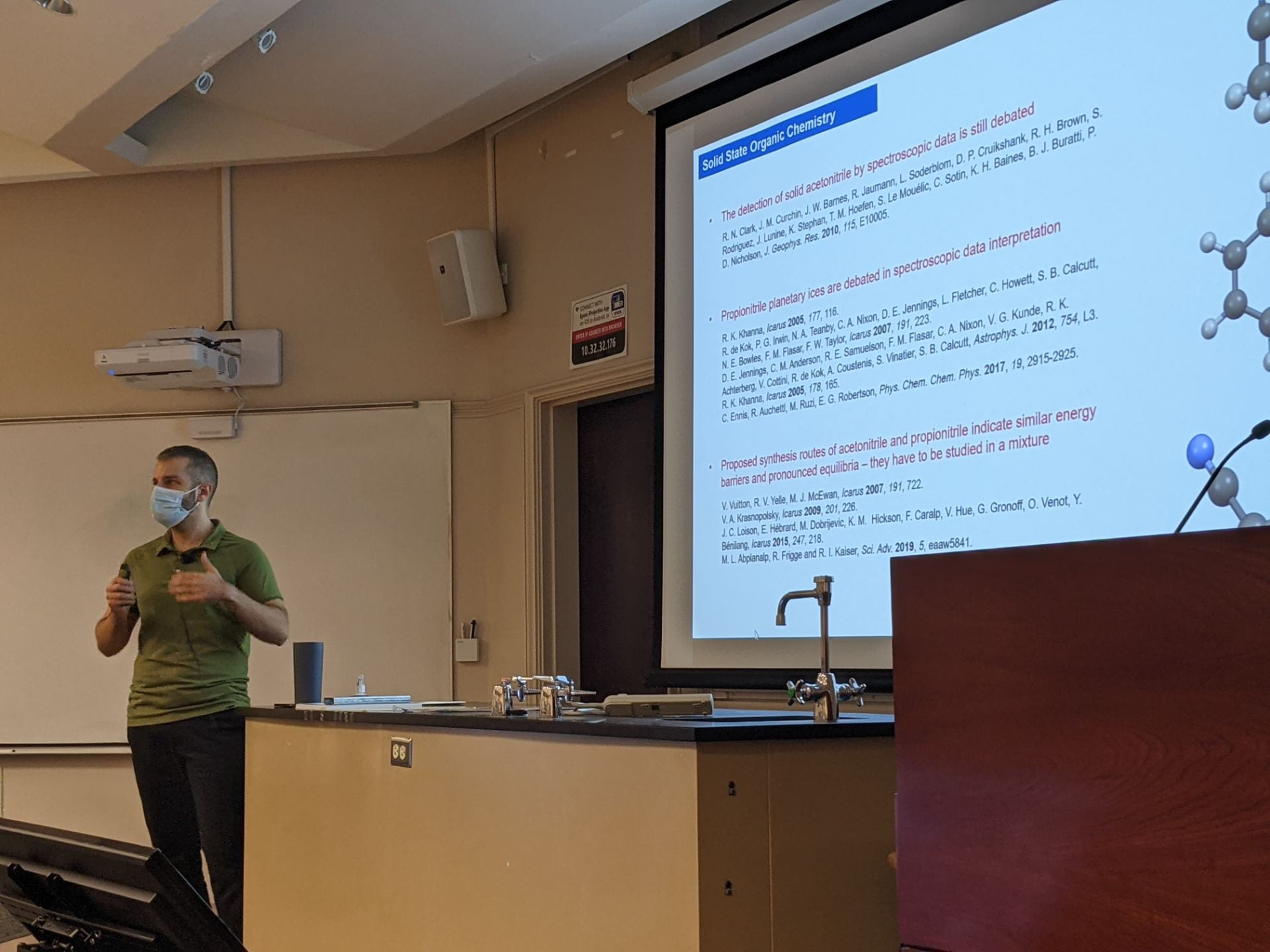
In this edition of the Friday Newsletter, welcome our new Physics Advisor, introduce new members of the department, and resume the monthly physics challenge and prize!
Contents
CHAIR’S WEEKLY MESSAGE
“In the Classroom”
It has been a joy to be back in the physical classroom. Sure, I am anxious and, sure, the students are anxious. We can all see the SMU COVID-19 dashboard recording more and more cases, and it’s putting a knot in our stomachs. But the energy, the life, the give and take of the classroom … I don’t know about you, but I have missed this.
As Department Chair, it’s very important to me to put my money where my mouth is. If faculty must teach in person, so must I. For example, I am teaching the Honors Introductory Physics course on Monday evenings. This class has broken every enrollment record we’ve ever set (previously 16 students) in the more than half-decade the course has been in existence. I am working with 27 students in 8 teams (of 3 or 4 students) and an undergraduate learning assistant who is also a veteran of this course. The energy in that room was intense during this past Monday’s “Game Night,” where the teams bond and compete over trivia and set the stage for resources for their projects.
I am also teaching the first half of PHYS 6160, to help our graduate students learn about the findings of physics education research and how they should inform teaching introductory physics. Finally, I am teaching the second half of PHYS 3340, Computational Physics, where we will engage in Monte Carlo simulation, interpolation, numerical integration, and other activities that will help students solve problems. That course is being run as a “just in time teaching” and “flipped” classroom, with reading before class, problems given out in class, and class time used to work through as many problems as possible. The instructor goes to the student that needs them, addressing learning hot spots.
Chairs at SMU are granted some teaching relief in return for their service; I have eschewed this relief to make it clear that if this pandemic is “all hands on deck,” then I have a pair of hands to sacrifice to the cause.
Am I anxious about being in a room with 27 energetic undergraduates? You bet. But to their credit, all students in my classes dutifully and properly wear those uncomfortable masks and, when possible, they distance themselves. Classrooms were not scheduled with social distancing as part of the assignment mandate, so that is something with which all of us are wrestling. We know distancing is an additional tool in the counter-COVID arsenal that we now don’t always get to employ.
SMU is requiring all faculty (with some key and well-documented exceptions) to teach in-person. Students, too (again, with well-documented exceptions), are in-person. Faculty were especially afraid ahead of the semester of how the students would react to mask requirements (either classroom-only or, as happened a few weeks ago, campus-wide). I have experienced overwhelming positivity about doing the right thing.
I wish I knew all students and colleagues were vaccinated, but that’s not where we are as an institution and masking and some physical distancing is the best we can do right now. As Chair, I want to help faculty who feel they cannot deal with their classroom in a positive way; they need only reach out to me. Those of you who have already availed yourself of support from the Department can speak to whether or not that was a useful exercise, but I want to work the problem until we get it resolved.
That isn’t to say I haven’t witnessed mischief … but it hasn’t been very organized. There is the student with their mask removed, sitting in the lobby of Fondren Science Building, swiping through their phone, who smolders with indignation when a faculty member reminds them that masks are required in the buildings. There is the student fresh out of lab, complaining loudly about a class to their friends in the hallway while doing so without a mask, even while their friends all wear them. These things are to be expected, and to be called out as necessary. Students, when pressed about the policy, do seem to get it. For that, I am grateful. It makes us a better community.
We’re still keeping an eye on how COVID-19 will continue to unfold on campus, when there is vaccination at some significant level and a masking requirement in campus buildings. We can do our part to minimize risk beyond our minimum obligations. Department social events, with the exception of refreshments before speaker series events, are still on hold and will remain so pending a review of campus conditions in the second half of September.
Let’s take a break from thinking about all this to look at some things that happened this week. We welcome our new Physics Advisor, introduce new members of the department, and resume the monthly physics challenge and prize!
Sincerely,

Stephen Jacob Sekula Chair, Department of Physics |
DEPARTMENT VIEWS
Welcome Prof. Durdana Balakishiyeva as the Physics Advisor
 We are excited to welcome Prof. Durdana Balakishiyeva to the position of Advisor to the Physics undergraduate program (“Physics Advisor”). She replaces Prof. Jodi Cooley in this role, and the two expect to have a transition process over the coming weeks and months as Prof. Balakishiyeva eases in the job.
We are excited to welcome Prof. Durdana Balakishiyeva to the position of Advisor to the Physics undergraduate program (“Physics Advisor”). She replaces Prof. Jodi Cooley in this role, and the two expect to have a transition process over the coming weeks and months as Prof. Balakishiyeva eases in the job.
The transition comes during a time of advising improvement efforts across SMU. The re-accreditation process for SMU came with the development of a “Quality Enhancement Plan,” or QEP. The current QEP is focused on student retention and enhancing 4-year graduation rates, especially for at-risk student populations. One of the pillars of this QEP is advising,. This has been recognized as a place where modest improvements in coordination, cooperation, and training (both for faculty and students) would go a long way to improving the student experience. Forthcoming improvements to the advising process are the use of the SMU “Booking” portal to better employ modern scheduling techniques to link students with the advisor while protecting faculty time,; and a system of advising notes that will allow advisors across departments and schools to share what advice has been given and when, within the constraints of student information sharing at a University.
Please welcome Prof. Balakishiyeva into this role in our department. Being Physics Advisor represents one of the highest levels of service to the department, and we are grateful to both Prof. Balakishiyeva for stepping into this role and to Prof. Jodi Cooley for serving many years over the last decade in this position.
The Physics Advisor’s job is to meet with students pursuing either a Physics major or minor, review their proposed class schedule to ensure they will meet the requirements of the program on their intended timescale (e.g. 4 years), inform them about different classes and how/whether they meet program requirements, and deal with particular issues specific to each student. The Advisor brings difficult questions related to classes, credit, and our curriculum to the Undergraduate Committee to have those issues resolved by that body, and should maintain close contact with the Director of Undergraduate Studies.
Relax this Labor Day Weekend with the Complex Chemistry of Titan
Did you miss our first Department Speaker Series event of the year? We had over 50 participants in this first colloquium, half online and half in person … but never fear, if you were not one of them. We record these events! As you relax and unwind over this Labor Day Weekend, enjoy this talk by SMU Department of Chemistry Assistant Professor Tom Runcevski.
All past speaker series events since August 2020 are available in our YouTube playlist. Learn more: https://www.physics.smu.edu/web/seminars/
Welcome New Theoretical Cosmology Post-Doctoral Researcher Dr. Joe Ryan
 We are excited to welcome Dr. Joseph Ryan to the theoretical cosmology group as a post-doctoral researcher. He began his position at SMU on September 1. Joe completed his undergraduate degree at Wichita State University then moved onto Kansas State University where he earned his Ph.D. earlier this year. Joe has utilized a wide array of astronomical observables including baryon acoustic oscillations, quasar measurements, and gamma ray bursts to constrain cosmology. These constraints apply to things such as models of dark energy.
We are excited to welcome Dr. Joseph Ryan to the theoretical cosmology group as a post-doctoral researcher. He began his position at SMU on September 1. Joe completed his undergraduate degree at Wichita State University then moved onto Kansas State University where he earned his Ph.D. earlier this year. Joe has utilized a wide array of astronomical observables including baryon acoustic oscillations, quasar measurements, and gamma ray bursts to constrain cosmology. These constraints apply to things such as models of dark energy.
At SMU, he joins the other members of the theoretical cosmology group to determine how observations of the cosmic microwave background can be used to study fundamental physics.
REMINDER: Departmental Social Events On Hold Until Late September
Apart from the Department Speaker Series, which is conducted in hybrid mode with a limited refreshment service beforehand, the department will freeze all other social events until the trajectory of the COVID-19 pandemic on campus can be understood. We will review the data in four weeks and make a decision about how to proceed beyond that.
Events currently on hold are the Hbar Coffee Bar on Wednesdays and Friday Department Lunch.
FACULTY NEWS
If you have something to share please feel free to send it along. Stories of your activities in research, the classroom, and beyond are very welcome!
STAFF NEWS
Welcome New Student Workers to the Department
We are pleased to welcome some new faces to the Department Main Office this fall: our newest student office workers! Please make them feel at home and expect to see them helping out with department tasks and at department events.

Olivia Roth (2nd-year) – Engineering Major 
Ian Smith (2nd-year) – Environmental Engineering + Math Double-Major 
MacKenzie Thierry (1st-year) – Biochemistry Major
STUDENT NEWS
If you have something to share please feel free to send it along. Stories of students in research, the classroom, internships or fellowships, awards, etc. are very welcome!
Meet a New Graduate Student – Part 1
We asked the new graduate students to tell us a little about themselves, and about their feelings regarding … pineapple on pizza (we recognize this is a culturally anchored question, and broadened it to allow for commentary of the idea of pineapple cooked with tomatoes and cheese).
We’re printing the responses in a series over the next few weeks. Here’s what we learned so far…
Cody Holz
I was born in Chicago Illinois and raised in a northwest suburb of the city called Carol Stream. I finished high school in 2017 and attended a small university in St. Paul Minnesota called Bethel University.
As an undergrad I got involved with research in High Energy Physics and had the opportunity to spend 3 1/2 weeks at CERN during the summer of 2019. Moving down to Texas has certainly been a bit of an adjustment because throughout high school and college I discovered that I love colder weather. As long as there is little to no wind, I can walk around outside in 10 degree Fahrenheit weather with jeans and a hoodie no problem (I’m sure some of you think I’m crazy and maybe I am. My Minnesotan friends complained about the weather more than anyone else and they think I’m nuts).
From when I was about 8 to 16 I swam competitively year round and did some of it on and off throughout undergrad. It is an exercise that I would like to continue throughout grad school. Other ways I like to spend my down time are playing games or reading novels written by authors such as Stephen King and George R.R. Martin.
I have been asked to answer the following controversial question: is pineapple acceptable on pizza? From my experience, I have enjoyed pineapple on pizza although it is not my go-to.
We’ll meet out other first-year graduate students in upcoming Friday newsletters.

Mohammed Aboelela 
Cody Holz 
Rebecca Moore 
Austin Mullins
ALUMNI NEWS
If you are an alum of the doctoral, masters, majors or minor programs in Physics at SMU, or have worked in our program as a post-doctoral researcher, and wish to share news with the community, please send your story to the Physics Department and we’ll work with you to get it included in a future edition.
THE BACK PAGE
The Physics Teacher’s September Physics Challenge!
 Society of Physics Students Faculty Advisor and our department’s informal “Puzzle Master,” Prof. Randy Scalise, invites you to try to solve this month’s physics challenge from The Physics Teacher. The first correct solution he receives (scalise@physics.smu.edu) from a student member of our Society of Physics Students will be awarded a prize. Join our SPS chapter today to make yourself eligible! (contact Dr. Scalise if you want to do this – you needn’t be a physics major or minor to join the SPS).
Society of Physics Students Faculty Advisor and our department’s informal “Puzzle Master,” Prof. Randy Scalise, invites you to try to solve this month’s physics challenge from The Physics Teacher. The first correct solution he receives (scalise@physics.smu.edu) from a student member of our Society of Physics Students will be awarded a prize. Join our SPS chapter today to make yourself eligible! (contact Dr. Scalise if you want to do this – you needn’t be a physics major or minor to join the SPS).
Fun fact: Prof. Scalise is again noted in The Physics Teacher (see below) as one of the people contributing correct solutions to these challenge problems, cementing again his position as “puzzle master” for this activity!
For now, the prizes continue (unclaimed!) to be the same as last year. The winner will get to select from the following four books,
- Gleick, J. “Chaos: Making a New Science“.
- Crease, R. P. and Mann, Charles C. “The Second Creation: Makers of the Revolution in Twentieth-Century Physics“.
- Thorne, K. “Black Holes and Time Warps: Einstein’s Outrageous Legacy“.
- Greene, B. “The Fabric of the Cosmos: Space, Time, and the Texture of Reality“.
Solutions must be complete enough to understand your strategy, reasoning, and methods; providing answers with no explanations are not acceptable. Dr. Scalise urges submitters who believe they have the correct answer to, of course, also submit their solution to The Physics Teacher using the email address challenges@aapt.org. Make sure to follow the journal’s guidelines for submissions (see below). The deadline is the last day of this month.



